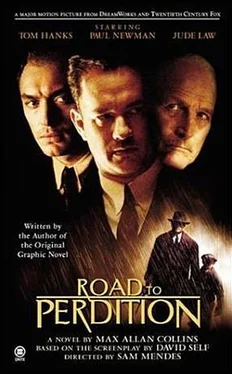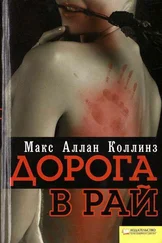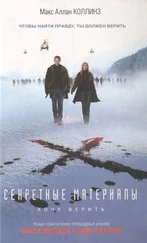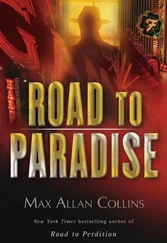O’Sullivan raised the .45, leveling it directly at the lawyer’s head.
Kelly was an old courtroom warrior and there was steel in his eyes as he replied, “You figure putting a gun to my head will make a difference? I can’t tell you what I don’t know, Mike. Now, go while you have the chance... and take the money. Make a new life with, uh... Michael’s alive and well?”
“He’s alive.”
The lawyer sighed in relief, or pretended to. “Good. Thank God. Jesus, put that gun down! I’m not part of this. I’m just an emissary. A messenger!”
“Then you wouldn’t mind giving John Looney a message for me?”
Kelly beamed benevolently. “Not at all. That’s what I’m here for.”
O’Sullivan thumbed back the hammer on the .45, a small click that seemed to echo in the room.
The lawyer’s eyes widened in alarm. His mouth dropped like a trapdoor. “But... but you said you wanted me to deliver a message to Mr. Looney... ”
“Oh, and you will,” O’Sullivan said, and shot the man in the head.
Teeth chattering from the cold, Michael, in the car, thought he heard a gunshot, but he wasn’t sure; it sounded far away. And then, before very long, his father was sliding in behind the wheel. He didn’t look the same, somehow.
“Getting colder,” Papa said. “I threw a blanket in back. Get it. Wrap it around yourself.”
“Okay, Papa.”
Michael got the blanket, bundled himself.
As he drove quietly away from the hotel, Papa asked, “No one bothered you, son?”
“No... but what happened in there, Papa?”
His father thought for moment; then he said, “I declared war.”
Michael, not understanding, asked, “Where are we going?”
“To Chicago. There’s a man there who runs things. I’ve done work for him, at Mr. Looney’s behest. I have to find out where this big man stands.”
“Oh.” Michael leaned against the door, wrapped in the blanket. Despite everything that happened, he was so exhausted, the boy knew he would fall asleep at once. Before he did, he managed a final question. “What’s the big man’s name, Papa?”
His father let out a breath. “Capone,” he said.
But Michael was already asleep.
In the early months of 1931, Chicago suffering a typically chill winter, the city’s most famous citizen — Alphonse Capone — was nearing the end of his criminal reign. Eliot Ness and his squad — who would enter American mythology as the Untouchables — had for several years been costing Capone dearly, seizing and/or destroying many of his assets .
Treasury agent Ness also collected tax ledgers that were turned over to Elmer Irey and Frank Wilson of the IRS, the second prong of the government’s dual attack. With these and other confiscated records, Irey and Wilson would soon bring Capone down; but the criminal organization “Scarface” Al headed would go on without him, and even thrive .
Prohibition had been around for over ten years, and just about everybody considered it a colossal flop, unenforceable legislation that had paved the way for hoodlum Caesars like Big Al. For a time Capone had seemed a benign public figure, attending ball games, sending toys to orphanages, funding soup kitchens, an outrageous larger-than-life character .
But ordering the murder of a reporter in a busy train station was just one example of Capone’s arrogance; and the bloody St. Valentine’s Day Massacre was a notable other one. His shenanigans attracted the attention of President Hoover, which led to the efforts of Ness, Irey, and Wilson .
Many considered the real brains behind the Capone organization to be Capone’s second in command, Frank Nitti. A former barber, and a cousin of the big man, Nitti had gone from the role of Capone’s chief enforcer — the job my father held in John Looney’s organization — to his heir apparent .
Nitti was at the fore of the new breed of gangster. He understood that the mob was like any American big business, and that the murderous ways so ingrained in thugs like Capone, who’d come up through the street, had to be kept in check. Under Nitti, the so-called Chicago Outfit would expand into legitimate businesses and, in particular, unions; the killing would continue, when necessary... but more discreetly .
When my father and John Looney fell violently out, the Chicago Outfit was already on the precipice of change. Capone was still in charge, but facing indictment on various charges. Almost certainly Frank Nitti knew he would soon sit in the chair, the throne, vacated by the most famous criminal America ever created .
O’Sullivan drove through the night, often taking back roads and circuitous routes on his journey to Chicago, though he did not expect Looney or his men to anticipate this move. His son slumbering beside him, O’Sullivan experienced a strange combination of clarity — he was not at all tired — and a dream-like state. His headlights cut through darkness like searchlights, and the winter-barren farmland — some of the richest land in the United States — seemed a surrealistic wasteland around them.
When night began its fade to morning, light easing over the endless fields, the rural landscape took on a stark reality, and beauty. Annie had an eye for such things. Like any woman, she would point out colorful flowers, in summer; but at this time of year, she might also draw his attention to a tree silhouetted against the sky like a ghostly skeleton.
The boy slept. O’Sullivan was thankful for that, and when Michael did finally wake, they were deep in Chicago’s Loop, skyscrapers looming, safe and anonymous in the morning traffic.
“It’s so big,” the boy said, eyes wide, looking all around at the man-made canyon walls. “Is this Chicago?”
“Yes.”
“Where are we going?”
“You’re going to the library.”
Michael looked at him curiously, but asked no questions. The boy was smart — maybe not as smart as Peter had been, but nobody’s fool. O’Sullivan could tell that the boy understood a haven was needed for him, while his father did what he had to.
The Chicago Public Library faced Michigan Avenue between Randolph and Washington Streets. The turn-of-the-century classical-looking building was not a skyscraper, rather a massive elongated limestone structure, a fortress of knowledge. The boy would be safe, there.
Before long, they were on foot, just a man in a topcoat and fedora, and a boy in a jacket and cap, in a sea of early-morning workers — businessmen, secretaries, blue-collar types — and, again, O’Sullivan felt secure in their anonymity. He escorted his son — he’d instructed the boy to bring along his small suitcase — in on the building’s Washington Street side, entering an immense world of glass mosaics and marble; Michael’s reaction of wonder touched the father in O’Sullivan, despite all he had on his mind.
He walked the boy to a huge reading room, where students and other scholars mingled with the down-and-out, mothers with babies, and the elderly, all just escaping the cold.
Sitting Michael down at an individual table, O’Sullivan said, “I want you to wait for me.”
The boy’s anxiety leapt in to his eyes, but he merely said, “Okay, Papa.”
“I won’t be long, son. You’ll be all right?”
Michael nodded.
“If you want to get up, and get something to read, you can. Otherwise — stay right here.”
Michael shrugged. He lifted up his little suitcase. “I brought my own books,” the boy said.
O’Sullivan almost smiled. “You still have that little gun I gave you?”
Michael patted his coat pocket.
“Good boy,” O’Sullivan said. “Now if anyone comes at you with their own gun, do you know what to do?”
Читать дальше












